Management Approach Employees
The fact that work must not make people ill is so self-evident that there is no need to discuss it. However, Hochland would like to take this idea further and ensure that work actively contributes to the health and satisfaction of its employees.
Good working conditions, health and safety at work, equal opportunities and training offers with regard to sustainability – this is what is demanded of Hochland. The company identified these factors in a stakeholder survey in 2019.
Topics and Challenges
Hochland wants to continue to be an attractive employer for its employees in the future, too. For the area employees Hochland has prioritised the topic of health and occupational safety. For reasons of transparency, Hochland also reports on the topics of corporate culture, remuneration and social benefits, education and training, career and family as well as employee commitment.
Strategic Approach

Hochland sees its employees as the key to its success. That is why the company wants to enable them to carry out meaningful work in an environment that promotes healthy working and living. Hochland is trying to achieve this goal by means of constant measures for promoting health and safety at work, as well as employee participation. The company is working just as consistently to enhance its attractiveness as an employer, too. Both areas are to contribute to making Hochland a flagship company for the German food industry.
Attractiveness as an employer is an important goal as part of Hochland’s corporate strategy. Hochland has developed its current human resources strategy based on this and other strategic goals. The strategy is set out for three years, reviewed annually and adjusted if necessary. Hochland has divided its current human resources strategy, for the years 2019 to 2021, into four focus areas:
Support transformation
Adjust, develop, maintain
HR Business Excellence
Cross-departmental HR projects
For Hochland it is important that its employees reflect a cross-section of society. Diversity in the company therefore means not only equal opportunities for women, men and other genders, but also equal opportunities regardless of origin, age, religion, sexual orientation or disability. Hochland regards the General Equal Treatment Act (AGG) as the basis and is implementing further and more far-reaching measures regarding equal treatment. Hochland has laid down the rules of respectful coexistence in the Code of Conduct and the Guidelines for leadership and cooperation. There is a contact point in the company for problems and complaints. Here the concerns of those affected are listened to.
What is important to us and what will become increasingly important in the future are further education, diversity and equality.
Nis Nürnberger, Managing Director
Hochland is convinced that cooperation based on trust can only develop if the interests of employees and employers are taken into account on an equal footing. The company therefore relies on constructive cooperation with employee representatives and dialogue on an equal footing. Works councils, as representatives of the employees, are represented on the Supervisory Board of Hochland Deutschland as well as on the Economic Committee.

Control
The Head of Human Resources reports directly to the management. The board level of Hochland SE is involved in issues of overriding importance.
Personnel development at Hochland is a separate department with five people. Their job is to plan and implement training and further development measures in the company.
As part of the Objectives and Key Results cycle, the results are compiled, reviewed and discussed regularly by the Human Resources team.
Important Projects
Strategically important goals, whose implementation Hochland began in 2019, were an employer branding strategy, a new concept for personnel and organisational development and an initiative to digitalise the human resources area. For 2020 and 2021 Hochland is planning to advance its employer branding strategy, review the working time models, advance the demography concept and develop a company health management concept.
Measuring Success
Hochland continuously sets itself targets with regard to its human resources strategy. These are evaluated at least once a year in terms of their effectiveness as part of the New Performance Management initiative. In addition, Hochland, in cooperation with the Great Place to Work competition, conducts employee surveys every three years.
Hochland’s Ambition for the Employees Area
Employees |
||
| Ambition: Our employees are our key to success and we want to offer them meaningful work in a
health-promoting environment. That is why we are continuously taking measures to promote health, occupational safety and employee participation. |
TARGETS FOR THE EMPLOYEES AREA
| Targets 2015/2016 | Status |
| Hochland is promoting the health rate by improving workplace ergonomics at the Schongau site.1 | |
| Hochland is promoting the health rate by improving workplace ergonomics at the Heimenkirch site.1 | |
| Hochland takes part in the Great Place to Work competition every three years (next participation in 2019). | |
| Hochland organises annual Sustainability Days at the Heimenkirch and Schongau sites.2 |
1 In order to ensure better measurability, Hochland has changed the formulation of this objective from 2020.
2 In order to ensure better measurability, Hochland has changed the formulation of this target from 2017 and is
adapting it again from 2020.
| Target not achieved | Target partially achieved | Target largely achieved | Target fully achieved |
| Targets 2020/2022 |
| Hochland implements at least 20 ergonomic measures per year to protect the health of its employees. |
| Hochland’s new canteen concept offers a sustainable, healthy and tasty range of food – from 2020 Hochland is introducing a meat-free day and reducing food waste (comparison year 2018). |
| Additional target: The participation rate of employees in the Great Place to Work survey remains the same or increases (compared to the previous survey). |
| From 2020, Hochland will organise one sustainability event per year for its employees and will increase the number of participants from the current total of 350 people at both locations (in 2019) by 50 people per year – from then on the level will be maintained at 500 participants. |
Many of our employees see themselves as Hochländers. This identification with the company is an expression of a strong sense of belonging and is a powerful mark of distinction for us.
Hochland is a family-owned company that is guided by clear values. Respect and fairness in dealing with each other as well as orientation towards customer needs and high quality standards form the basis of our corporate culture. The company management is well aware of how important its employees are in achieving economic success. This means attractiveness as an employer is a key strategic parameter within the corporate strategy. To this end, Hochland has a personnel policy that rewards and promotes employee commitment. This includes fair remuneration, above-average social benefits, opportunities to combine work and family life and to work in an age-appropriate manner. Hochland sees equal opportunities, diversity, training and professional development as prerequisites for sustainably developing the company. Lifelong learning, systemic knowledge and personal development are becoming increasingly important due to demographic and technological developments.
Communication and Participation
Trust and openness form the basis of communication at Hochland. Employees are always kept up to date on important developments. To this end, Hochland uses all available communication channels, such as company and departmental meetings, circulars, posters, employee newspaper and the intranet.
We know that we have to look hard
to find new talent.Nis Nürnberger, Managing Director
Hochland shapes its corporate culture in many key areas in a participatory manner. Employee participation is reflected, for example, in the process of drawing up Vision 2025, which incorporated suggestions from a broad base of employees.

Feedback Mechanisms
Hochland regards a functioning feedback culture as an essential factor for a motivating working environment. This is supported by annual staff appraisals, feedback questionnaires on all further training events and regular employee surveys. In the management circle, Hochland has been working with 360 degree feedback for many years to objectively assess management and leadership skills.
Flat hierarchies and short decision-making paths also help ensure that the workforce can work with a high degree of autonomy. Hochland expressly encourages employees to contribute their skills to the company – this can be done, for example, through the company suggestion scheme.
Satisfaction as a Success Factor
To ensure the high quality of its products, Hochland relies on employees who feel comfortable in their working environment. To this end, the company promotes personal dialogue and open exchange, both about positive aspects and potential for improvement. For the professional and personal development of its employees, Hochland relies on training programmes tailored to their needs. Hochland demands and promotes an open and appreciative working atmosphere.
The fact that Hochländers feel at home is reflected in a low rate of fluctuation – between 3.2 and 6.2 percent in the period under review – and in a high proportion of employees who have been with Hochland for more than ten years. The fluctuation rate increased during the reporting period. This is primarily due to the increased share of temporary help. The average length of service in the reporting period was between 13.6 and 14.5 years.

Assessing Attractiveness as an Employer
Hochland also has its employee satisfaction assessed externally in order to obtain as objective a picture as possible. In the Great Place to Work competition, employees are surveyed in detail about their employer every three years. In a 2019 survey the company was named one of the 100 best employers in Germany in 2020. Hochland came 21st in the category of companies with 501 to 2000 employees.
Hochland is publicly perceived as a responsible employer: for example, the news magazine Focus, in cooperation with Statista, the professional network Xing and the employer assessment portal kununu, Hochland once again identified the company as being one of the most attractive employers in Germany in 2019 and awarded it the title Focus Top National Employers.

Diversity as an Opportunity
Hochland sees cultural diversity as an opportunity and an enrichment for a creative and inspiring working environment. At the time of publication of this report, the company employs people with roots in about 38 different countries. For Hochland it is important to bring together different mentalities, cultures and perspectives in an atmosphere of partnership where there is no room for discrimination or for violations of human dignity. The company focuses on tolerance, integration and inclusion. In 2019, 4.5 per cent of Hochland’s employees were severely handicapped (degree of disability at least 50 percent or equivalent employees with a disability degree of at least 30 percent). For employees with disabilities there is a separate representation of interests within the company with contact to the management and the medical officer.
Hochland is committed to helping refugees. At the end of 2018, Hochland joined the Entrepreneurial Initiative Right to Stay through Work. Currently, about 15 people with a refugee background are employed in the company.
There was no information or indication that Hochland was directly or indirectly involved in human rights violations or discrimination during the reporting period.
It is part of our corporate culture to allow employees to participate in the company’s success, to which they make a decisive contribution.
Performance-related pay and comprehensive social benefits are therefore a matter of course for us.
The majority of the approximately 1,620 employees, around 93 percent, are paid by Hochland on the basis of the collective agreement for the dairy industry in Bavaria, including holiday and Christmas bonuses. The collective agreement defines gender-independent criteria for job evaluation and the associated remuneration, so that equal pay regardless of gender is already laid down in the collective agreement system. The remaining seven percent, who are not covered by collective agreements receive market and performance-appropriate remuneration, with an attractive base salary. All employees of Hochland are entitled to a share in the profits, depending on the pre-tax result of the Hochland Group.
Hochland is a member of the employers’ association of the Bavarian food industry and represented on the respective collective bargaining commissions. In order to find competitive solutions, management and employee representatives are in close contact. The most recent collective bargaining increase of 2.6 percent was implemented in October 2019. In order to ensure fair pay, the salaries of employees in the technical departments in Heimenkirch and Schongau were reviewed in 2018 and adjusted where necessary.
Temporary Staff, Interns and Trainees
Long-term working relationships based on trusting cooperation are an important success factor for Hochland. In order to be able to bridge bottlenecks during peak periods or holidays, temporary employees relieve the permanent staff. Many temporary employees make use of their work period at Hochland to gain a permanent foothold in the company. In the reporting period 2017 to 2019, Hochland took on a total of 178 people as permanent employees. Interns who work for the company for more than three months receive the statutory minimum wage, regardless of whether the internship is voluntary or compulsory. Hochland attaches great importance to the responsible use of temporary work. The current rate of temporary workers was 4 percent in the reporting period. Hochland has significantly improved the framework conditions for temporary workers and increased the hourly wage to 12 euros (13 euros after six months). This remuneration is significantly higher than collectively agreed and statutory requirements.
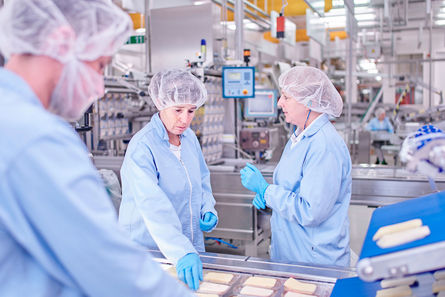
Providing for the Future
Hochland continues to look after its employees after they have left the company. For more than 50 years, Hochländers have benefited from a company pension scheme comprising old-age, disability and survivors’ pensions. As a collective agreement benefit, Hochland has paid 700 euros per year into the pension fund for full-time employees, and 800 euros per year since 2017. Proportionate amounts apply to part-time employees. As an additional company pension scheme, Hochland voluntarily pays its employees 1,000 euros net per year. Since 2017, it has been possible not just for groups of employees but also individual employees to pay into the pension fund. New employees are automatically included in the group accident insurance. This also extends to private life.
For us, competent and motivated employees are a prerequisite for innovative products and a high level of quality. In times of demographic change, we are challenged to find and train young talent as well as to train and qualify the entire workforce.
In Hochland’s guidelines for leadership and cooperation, learning and support are anchored as central tasks. Hochland’s personnel development offers all employees training and professional development opportunities and thus the chance to achieve individual goals and thereby increase personal satisfaction.

Hochland as a Training Company
The company not only trains young people with the aim of securing the next generation of employees. Hochland sees it as part of its social responsibility to offer young people a demanding training programme and thus the chance of a secure future. In 2019 Hochland employed 69 trainees and students. This makes the company one of the largest training companies in the Allgäu region and in Upper Bavaria. Hochland provides training in nine dairy, technical and commercial professions. In addition, there is the apprenticeship as a cook in the company canteen. Hochland offers young people the opportunity to build up and develop social skills by applying a holistic training approach. After completing their training, they are generally taken on for a limited period of two years, although Hochland generally aims to take them on into permanent employment. In addition, in cooperation with the Baden-Württemberg Duale Hochschule Cooperative State University, the company offers young people the opportunity to complete a dual course of study.
In the reporting period a Training Day took place in Heimenkirch and in Schongau several times. At these events, everyone interested was able to see what training and everyday working life in the company looks like.
Learning at All Levels
Hochland offers its employees numerous opportunities for training and professional development, including language courses, specialist seminars and project management training. The company encourages job rotation and departmental changes as well as international exchanges to broaden the skills and personal horizons of its employees. Within the framework of various development programmes, Hochland supports both experienced and junior executives. Hochland offers suitable applicants the possibility of further training to become a dairy master.
Training and Professional Development Measures
Since 2018, one focus of the work of human resources development has been to make Hochland fit for the future as a learning and adaptable organisation. The department organises around 50 internal training courses and advanced training sessions a year with a total of around 500 participants. In the period under review, Hochland increased expenditure on training from around 550,000 euros per year to approximately 700,000 euros.
Hochland Dairy Academy
At the Hochland Dairy Academy, specialist knowledge about the central raw material, namely milk, is imparted and the practical work of farmers is examined. Based on this knowledge, future challenges of milk production are analysed. So far, around 80 employees from management, marketing and sales have taken part in the Milk Academy.
A balanced relationship between work and private life is a prerequisite for motivated and satisfied employees. We see it as part of our responsibility to support employees in realising their life plans.
As a family-owned company Hochland is always striving for solutions as to how to combine career and family. In particular, employees with children or dependent relatives need a workplace where they can adapt working hours to their personal needs. Whenever possible, Hochland takes into account the individual wishes of its employees.
Flexible Working Time Models
During the period under review, between 21 and 32 percent of employees worked part-time, including temporary contracts. Of these, between 38 and 43 percent were men, and this trend is increasing. All employees covered by a collective wage agreement are subject to flexitime regulation. The associated works agreement promotes personal responsibility and grants more freedom with regard to individual time management.
Working hours are hours of you life. –
I find the term work-life balance misleading, because that would mean that work has nothing to do with our lives.Josef Stitzl, Managing Director
Employees also benefit from models for partial retirement. Hochland has committed itself to review annually whether partial retirement can be granted. The company has regularly fulfilled this voluntary commitment by providing 25 years of part-time work for older employees each year. In the period under review, Hochland enabled 21 employees aged between 56 and 63 years to switch to partial retirement.
Hochland offers employees in the commercial sector as well as managers the opportunity to work from home at times. Hochländer who live a long way from their workplace can be supported by offering home office work. Thanks to the help from temporary workers, Hochland can arrange for leisure time compensation in an accommodating manner even during the summer months. An internal regulation ensures that social aspects are taken into account. In addition, Hochland offers all employees the option of 20 days’ unpaid leave per year.

Time for Children
Supporting mothers and fathers is a special concern of Hochland. That is why Hochland’s commitment goes far beyond the legal requirements. The company develops creative solutions for parental leave substitutions, part-time parental leave and parental leave returnees. Hochland employees can terminate or extend their parental leave early as required. Partner months for fathers are made use of as well as part-time options of up to 30 hours per week. In the period under review, a total of 143 employees took parental leave, almost 9 percent of whom were men. Hochland regularly offers a summer holiday programme for employees’ children at the Heimenkirch site.
Good working conditions, health and safety at work are very much in our own interests as a company.
Prevention plays an important role in health and occupational safety. Hochland promotes the well-being of its employees with ergonomic workplaces, health promotion, measures to encourage exercise and healthy eating as well as catering in its own company restaurants. The Berufsgenossenschaft Nahrungsmittel und Gastgewerbe (trade association for the food and catering industry) confirms that Hochland is on the right track here. In 2017, 2018 and 2019, it once again certified that occupational safety and health prevention at Hochland far exceed the statutory requirements. The award is linked to a bonus, which the company invests to optimise working conditions further.
Two pilot projects on health and safety at work are representative of a large number of measures:
Exercise and Health Pilot Project
The impetus for the Exercise and Health project came from the Great Place to Work survey. The health of the 87 voluntary participants was to be promoted through sporting activities and sports medical care with nutritional advice, training plans and performance diagnostics. Hochland launched this pilot project in January 2019, initially for the raw materials production area at the Heimenkirch plant. There are many employees with musculo-skeletal problems in this area especially. The anonymous evaluation of the project showed an increased awareness with regard to exercise and body awareness as well as an average reduction in body fat of 1.8 kilograms per person. The high dropout rate was rated less highly – of the original 87 participants, only 39 stayed on until the end of the project. Hochland therefore aims to rethink and modify the framework conditions for similar schemes in the future.
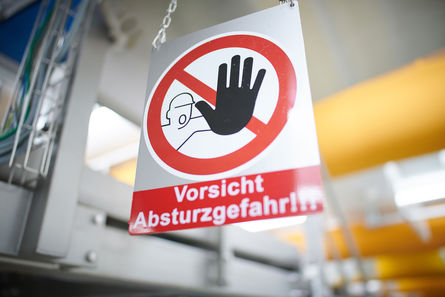
100 Percent Safe Actions Pilot Project
Unsafe actions in operational processes can result in hazards and consequently accidents. The aim of the project, which was launched in November 2018, is to prevent unsafe actions and thus further minimise the risk of accidents.
Together with an external partner, Hochland has developed a concept for changing attitudes and behaviour in occupational safety. Managers were trained and an information event was held for all employees taking part in the pilot project. The project was initially limited to the processed cheese packaging area at the Heimenkirch plant. Safe and unsafe actions were observed and documented in the work area. Employees received feedback on their actions, successful actions were highlighted and measures to avoid unsafe behaviour were defined. Participating employees and managers provided positive feedback, especially on the learning processes achieved by this project. The project will be continued from February 2020 for all employees in the production area at the Heimenkirch and Schongau plants.
First Aid and Fire Protection
Unfortunately, Hochland has not yet succeeded in completely preventing accidents at work. In 2016, the LTA rate (number of occupational accidents per million hours worked) was reduced significantly to 12.3 million compared to the previous year. During the reporting period, the LTA rate initially increased, but then fell in 2019. To be prepared for emergencies, Hochland trains first-aiders and fire protection helpers. In each case, there are considerably more helpers active than are required by law.
Health Promotion
In 2002 Hochland introduced a comprehensive company health management system for the Heimenkirch and Schongau sites and appointed separate health officers for each of the two sites. Together with the medical officers,
We are proud of our Hochländers and we want them to be healthy and feel good. That is why we promote health and occupational safety. This works best if the employees also take responsibility for their own resources. In this way we can create sustainable values together.
Nis Nürnberger, Managing Director
the company also organises preventive medical check-ups. Hochland has implemented a new medical officer concept. Since 2018, several medical officers have been working at both plants. In the period under review, the technical equipment of the medical officers was expanded so that all necessary preventive medical check-ups can now be carried out directly on site. In addition, know-how in the field of modern industrial medicine was expanded. Professional advice can now also be given on the topics of workplace glasses and vaccination issues. A flu vaccination campaign has been in place at all sites for several years. The vaccination can be taken during working hours and is financed by Hochland.
Other health promotion measures during the reporting period included first-aid courses, sports tournaments, running groups, fitness courses, motivational schemes for employees who come to work on foot or by bicycle, discounts for visits to fitness studios and other offers to promote exercise, relaxation and healthy nutrition.
Hochland’s efforts in this area have not yet paid off in the short term. The health rate remains at an almost constant level.
Nutrition

Hochland also sees catering for employees as an important component of preventive health care. The company restaurants prepare fresh and varied dishes every day. The restaurants are subsidised by Hochland, so employees pay only 3.50 euros for a complete main meal.
Hochland has developed a new concept for the company restaurants. Since 2018, the kitchen has been focusing on sustainable offerings to an increasing extent. In addition to regional and seasonal fruit and vegetables, the Schongau site purchases organic quality meat from a social institution in the neighbourhood. Theme weeks, vegetarian and occasionally vegan dishes, muesli weeks and free apples provide a healthy diet.
Reducing Noise Pollution
Noise can also lead to health problems. For this reason, Hochland takes situation-dependent measures to limit noise, over and above the legal requirements, starting at a noise level of 80 decibels. The company makes sure that the employees concerned use the hearing protection provided. Preventive medical check-ups, hearing tests and training are also mandatory for employees working in noisy areas.
Tested Safety
Hochland’s occupational safety management is certified according to ISO 45001:2018. The company continuously identifies potential sources of danger together with auditors. Identified risks are minimised wherever possible by means of suitable preventive measures. Hochland consistently gets to the bottom of the causes of any accidents and does its utmost to eliminate them.
Impart Knowledge
In order to minimise risks, Hochland considers it important to plan ahead, particularly in the area of health and safety at work. Hochland therefore sensitises employees about these issues and provides basic knowledge in training courses.
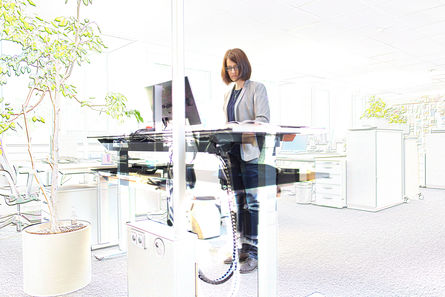
Ergonomics in Production and Administration
The adaptation of working conditions to the needs of people can contribute significantly to the health of Hochland employees. This is why the company focuses on ergonomically designed workstations. In addition, Hochland offers training courses on ergonomic optimisation for managers in production and technology as well as for designers of production plants. During the reporting period, Hochland implemented numerous measures to improve ergonomics. Especially activities such as lifting and carrying are now technically supported in many places. Many production motion sequences have been changed in such a way that they are no longer a physical burden.
For the administrative area at the Heimenkirch site, Hochland has invested around 260,000 euros in purchasing 300 height-adjustable tables so that employees can work in a standing position. The company has taken measures to improve room acoustics and lighting quality and has carried out CO2 measurements in offices. In 2019, Hochland, in cooperation with the AOK health insurance, optimised office workplaces with regard to ergonomic aspects. Employees at desk workplaces received practical advice on how to handle height-adjustable tables and suggestions for easy-to-implement improvement measures at the workplace.
We stand by our social responsibility. Shareholders and employees also actively carry the values of our company into society through voluntary commitment for charitable purposes.
Hochland’s corporate culture supports social and charitable activities and creates space for them. Fundraising campaigns and volunteer work often focus on disadvantaged children and young people. The company is currently working on a new donation strategy.
See also -> the chapter Corporate Governance -> Social Commitment.
Diligent Donors
It is a tradition for Hochländers to organise their own fundraising campaigns within the workforce. In 2018, for example, almost 8,000 euros were collected from various activities. The donations went to institutions such as the Förderkreis für krebskranke Kinder im Allgäu (charity for children with cancer), the association Sympathiehunde in Kißlegg, the children’s hospice Bad Grönenbach and the Kinderbrücke Allgäu. A part of the donations went to the campaign Gemeinsam für Alois (Together for Alois). In cooperation with the German Bone Marrow Donor Registry (DKMS), stem cell donors were sought for a colleague who was ill – and people suffering from blood cancer worldwide. Company typing of stem cell donors took place once during the reporting period. Hochland assumed the laboratory costs incurred.
The running team at the Heimenkirch community market festival is also a tradition. Hochland pays the entry fee and provides running jerseys. For each round that is completed, an amount is donated to social institutions or projects in the area.
Active Hochland Employees
Many employees are active in helper groups for refugees, or in the working group SchuleWirtschaft (school/economy), where they provide career information and help with application training. Parts of the workforce are also represented in sports clubs, music bands, local politics and the voluntary fire brigade. Hochland supports this commitment. Members of the volunteer fire brigade, for example, are always released from work for their assignments.
With Ownership Comes Responsibility
The owners of the company are also very aware of their social responsibility. Thus numerous local projects in the social sector have been and are being financially supported. The focus here is on measures with long-term effects to provide more equal opportunities, especially for children and young people from socially disadvantaged families or those disadvantaged by personal fate. Many projects are therefore created in cooperation with schools in the region. Examples are socio-pedagogical support, mediation of conflict resolution strategies or cooperation with a music school to promote the musical education of children. In addition, Hochland’s shareholders work together with organisations that focus on promoting the development of children, such as the Child Protection Association or the Kreisjugendring (district youth association). One of our concerns here is to support children and young people in such a way that they are strengthened in their personalities and acquire a school-leaving certificate, thereby ensuring they have the prerequisites for successful vocational training. In this way, the Hochland shareholders wish to take account of the fact that the success of the company is also based on its well-trained employees.
